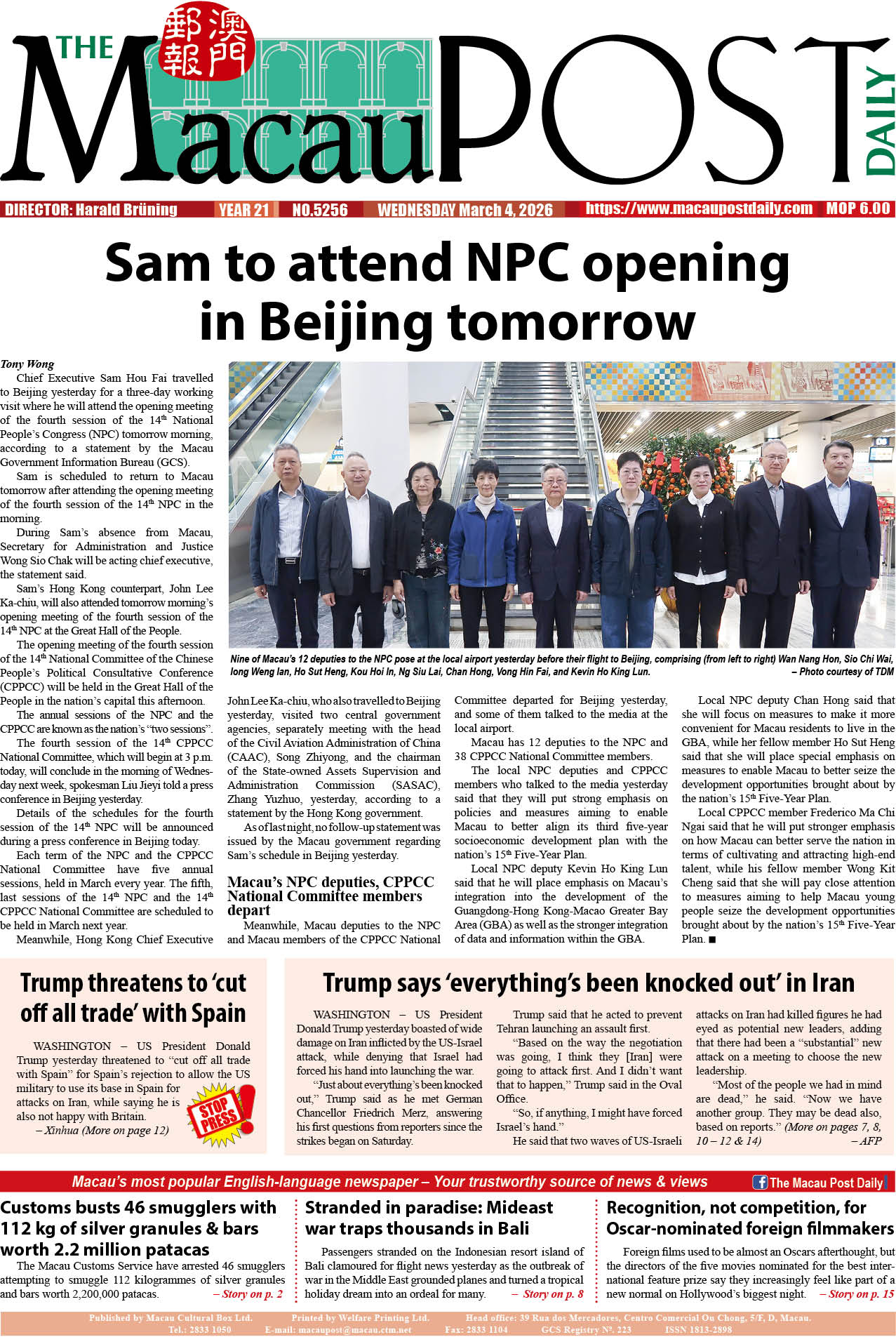Secretary for Social Affairs and Culture Elsie Ao Ieong U says that the government expects a high-rise rental housing project for senior citizens in an area of Plot P in Areia Preta district – the plot of the ill-fated Pearl Horizon residential project – to be completed in 2023, in which case seniors would be able to move into the flats in 2024.
The policy secretary also says that the government’s decision to commission private social service organisations to run the building’s social service facilities would be an effective model.
Ao Ieong made the remarks during Wednesday’s Q&A session in the legislature’s hemicycle about her portfolio’s policy guidelines for next year.
The rental housing project for seniors on Plot P was first proposed by Chief Executive Ho Iat Seng in his 2020 Policy Address which he delivered in April, when he said that the new project aimed to help senior citizens living in low-rise walk-ups improve their living quality. Ho said in April that under the scheme, senior citizens could rent out their flats in walk-ups so that they could move to the flats in Plot P equipped with lifts and use the money they receive from renting out their walk-up flats to cover the rents for their studio units in the Plot P building, and therefore they could have their living quality improved.
The Infrastructure Development Office (GDI) announced last month that the government expected to start construction of the rental housing project for seniors by the end of this year, striving to complete the project within three years. The building consisting exclusively of rental flats for seniors – the first of its kind in the government’s housing programme – will have some 1,800 studio flats, with various kinds of social service facilities.
The area earmarked for the project, which is located at the southern tip of the 68,000-square-metre Plot P, covers an area of 6,828 square metres. The project comprises two hotel-style apartment towers to be built on a podium – which will house social service facilities – and an underground public car park.
During a Q&A session last month about his 2021 Policy Address, Ho told lawmakers that the rental housing project for seniors on Plot P will be a pilot scheme which will allow the government to gauge citizens’ views about this kind of housing, adding that the government would build more such projects elsewhere in the city if the future operation of the project on Plot P proves to be a success.
Ho said last month that the government will commission a private social service organisation to run a restaurant in the building, which will also include medical facilities and dialysis machines.
During Wednesday’s plenary session, Ao Ieong said that the government was studying the future management model of the rental housing project for seniors, including the operation of its social service facilities.
Ao Ieong said that considering the Social Welfare Bureau’s (IAS) previous experiences, the government has concluded that commissioning private social service organisations to run the building’s social service facilities would be an effective model. The policy secretary also said that the government was still designing the future model of the building’s property management service.
Ao Ieong said that while the rental housing project for seniors will be operated like an apartment hotel, various social service facilities will be set up there, such as an activity centre for seniors. She also said that various kinds of services will be provided, such as recreational activities, voluntary services, interest classes, and rehabilitation services.
Ao Ieong also said that the services provided in the rental housing project for seniors would also include special features to promote intergenerational harmony.
Regarding the future application requirements for renting flats in the building, priority will be given to seniors with reduced mobility living in low-rise walk-ups , Ao Ieong said, adding that the government would also take a number of other factors into consideration when assessing the applications, such as the applicants’ age, health conditions, and whether they have caregivers.
According to the GDI website, the office has granted China Construction and Engineering (Macau) Company Limited a two-billion-pataca contract for the design and construction of the project without a bidding process.
Recognition of Macau Health Code by all mainland areas
Meanwhile, Ao Ieong also said that the Macau government has been discussing with the central government the possible recognition of the Macau Health Code by all provinces, autonomous regions and municipalities.
The Macau Health Code and the Guangdong Health Code have been mutually recognised since May so that those travelling between Macau and Guangdong can switch their nucleic acid test (NAT) certificate between the two health code systems. As the Macau Health Code and the health codes of all the other provinces, autonomous regions and municipalities in the mainland are not currently mutually recognised, those travelling from Macau to any of those areas, and vice versa, have to present a paper NAT certificate when passing through immigration.
Ao Ieong said that local health officials including Health Bureau (SSM) Director Lei Chin Ion had visited Beijing where they met their counterparts from the central government to discuss the possible mutual recognition of the Macau Health Code and the health codes of more provinces, autonomous regions and municipalities in the mainland. She said the local health officials realised after the meetings in Beijing that the mainland’s health code system is complicated as every province, autonomous region and municipality has its own health code system, adding that therefore there were “no conditions” for the mutual recognition of the Macau Health Code and the health codes of provinces, autonomous regions and municipalities other than Guangdong.
Ao Ieong also said that therefore the local government now aimed for all the other provinces, autonomous regions and municipalities to directly recognise the Macau Health Code. “This is the simplest solution,” she said, adding that the local government has been discussing the matter with the respective entities of the central government.
‘Do much and early’
Meanwhile, during Wednesday’s plenary session, Lei underlined the need for all authorities to roll out strict COVID-19 prevention and control measures in anticipation of possible risks. Lei noted that the spread of infectious diseases is always unpredictable, adding that therefore the later one particular government rolls out measures to bring the spread of an infectious disease under control, the faster the pace of the spread and the more serious the consequences.
Lei said that the fact that the COVID-19 epidemic has deteriorated in a “neighbouring region” was due to the fact that the official COVID-19 prevention and control work there had been rolled out too late. He did not name the “neighbouring region”.
Hong Kong is currently facing a new wave of local COVID-19 infections.
Lei said he didn’t want to see COVID-19 clusters such as “dancing clusters” and “mahjong clusters” spreading in Macau, and that’s why his bureau preferred “doing much and early” in its COVID-19 prevention and control work.
COVID-19 outbreak “clusters” have been reported in dance studios and so-called mahjong schools in Hong Kong.

Secretary for Social Affairs and Culture Elsie Ao Ieong U speaks during Wednesday’s Q&A session about her portfolio’s 2021 policy guidelines in the Legislative Assembly’s (AL) hemicycle.
Courtesy: TDM








